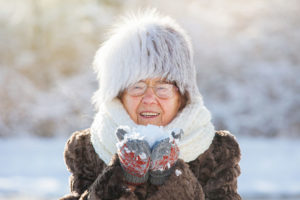 As the winter months approach, the senior in your life may require some extra attention and steps to keep them safe and healthy. Cold temperatures, snow, and slick sidewalks all have an enormous impact on a senior’s overall well-being. Here are some things that you can do to do to help your senior get ready for the long cold winter months.
As the winter months approach, the senior in your life may require some extra attention and steps to keep them safe and healthy. Cold temperatures, snow, and slick sidewalks all have an enormous impact on a senior’s overall well-being. Here are some things that you can do to do to help your senior get ready for the long cold winter months.
Schedule physical/flu shot with medical provider
Make an appointment for your loved one to visit with their health care provider. Make sure they get their annual flu shot during this visit and address any concerns you might have with the doctor.
Pack up summer clothing
Older adults are more prone to hypothermia, which is the result of too much heat escaping from the body. Seniors need to dress very warmly during colder months. Since some seniors have cognitive issues, it might be necessary to pack summer clothes away to keep seniors from making the mistake of wearing inappropriate clothing for the weather. Putting winter clothes out will reduce confusion in the senior and make their selection easier.
Take necessary steps to winterize the home
Check the home to make sure there are no places where heat can escape. Arrange to apply new caulking, sealants, or tarp to windows if needed. Be sure that weathering strips are around the doors to keep cold air out and electric bills down. It might be necessary to have someone come out and check a heating system if the senior heats the home with central heat. This is also a chance to make sure the gutters are cleaned out and remove any clogs.
Change curtains at windows to heavier drapes
Get rid of the summer curtains and put up heavier drapes at windows. Drapes will keep it warmer in the rooms, preventing heat from escaping through windows. Depending on how many rooms are used during the day, it might only be necessary to heat up a few rooms during the day. Heating up only the rooms used during the day or night will reduce the electric bill cost.
Check fire alarms and carbon monoxide detectors
Check all the batteries in fire alarms and carbon monoxide detectors. It is probably best to go ahead and change the batteries if you cannot remember the last time they have been replaced. The use of a fireplace, lantern, or gas heater can sometimes lead to exposure to carbon monoxide poisoning. Remember, people do not know when they are being exposed to carbon monoxide, it is colorless and odorless.
Pack an emergency winter kit
Pack an emergency winter survival kit for the senior. Everyone should have an emergency kit, just in case the power goes out overnight. The kit should include a flashlight, extra batteries, warm blanket, battery operated radio, and non-perishable foods and water. Do not forget to include a first aid kit as well. There should also be another first aid kit which is easily accessible in the home for minor accidents.
Post emergency contacts
Post emergency contacts for all those who will be helping care for your loved one. People helping care for them should know how to contact you at all times. Your elderly loved one should have numbers right at their fingertips if they should need to get in contact with someone right away.
Are you considering home care for your loved one? Elderlink caregivers help with tasks of daily to ensure your loved one is able to remain in the comfort of their own home. To find out more about our services, contact us.
